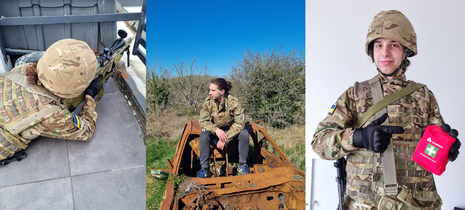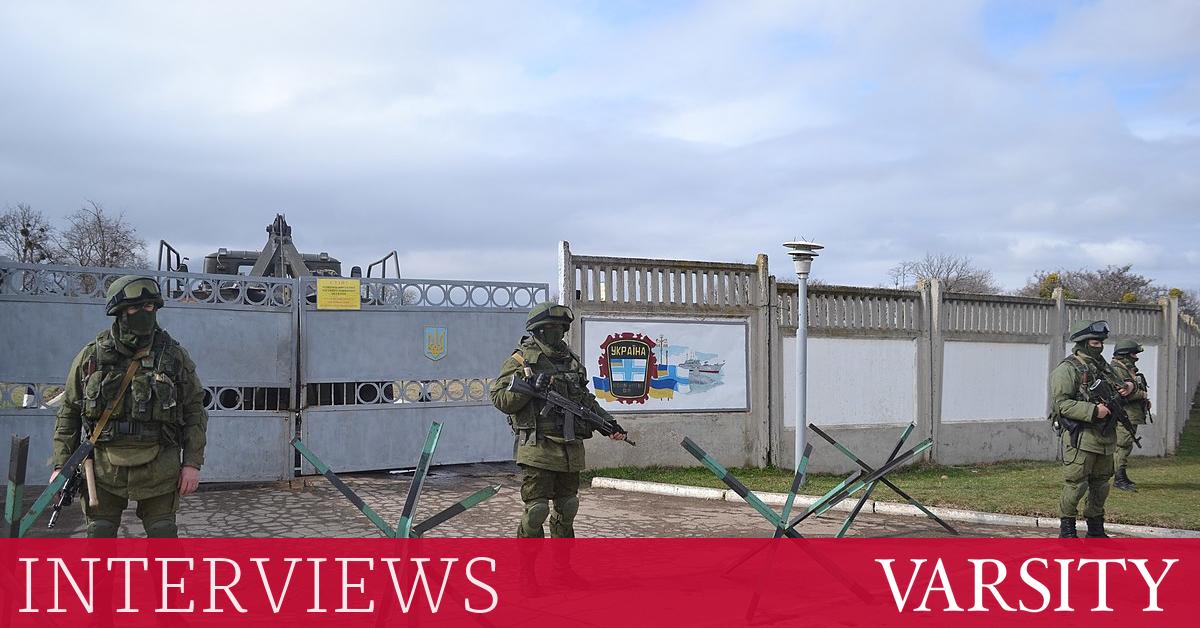It was a choice between going to Ukraine or forgetting part of my identity
Rosie Smart-Knight spoke to Nikolai Nizalov on his decision to return to Ukraine to fight

I called Nikolai Nizalov on a Sunday afternoon from my bedroom, not entirely sure what to expect from our conversation. I definitely didn’t anticipate being greeted by the familiar sounds of domestic activity. Nikolai was, he later explained, back in the United Kingdom for a week organising supplies, finding a car, and fundraising for his unit.
When asked if there was any direction he wanted the article to take, Nikolai responded: “My fundraiser, because it’s my unit that I’m raising money for.”
“It can’t get closer to the heart”
Nikolai, a first-year biology student at St Catharine’s College left for his childhood home, Ukraine, during Lent term. He drove supplies such as tourniquets, body armour, and helmets from the UK to the Ukrainian-Polish border. He told me his personal best was 19 hours and 20 minutes for the over 1,000 mile trip, which he has made three times now.
I asked Nikolai if the decision to return to Ukraine was a difficult one. He’d known for several weeks before the conflict officially began that, if anything were to happen, he would go to help.
“You do have to have that conversation [with] yourself, asking what you would do if stuff actually happened.”
It wasn’t a difficult decision. “It would either mean that I would have to completely cut out that part of me that is Ukrainian, or do what I have to do. Then I’ll be able to look my friends in the eye when I see them after the war.”

He shared that both friends and family are currently fighting the Russian invasion. His uncle is a surgeon in Kyiv, who he has been able to stay in regular contact with.
Nikolai is currently training with a small volunteer drone unit of nine multi-role fighters. For his unit, Nikolai says he’s a “medic/drone-pilot/driver,” and is thankful he has found somewhere that he is “really useful.” He has completed a condensed medical course, equipping him to deal with scenarios he’s likely to encounter, and is in the process of training to be a drone pilot.
His unit has the capacity to operate ten heavy-lifting drones, all of which can carry humanitarian cargo like donor blood and medication into areas that are closed to aid efforts, such as the besieged city of Mariupol.
However, currently the unit has only built two drones due to funding restraints. Nikolai explained that, to fully equip the unit, they have to raise £150,000. Each drone costs around £6,000, not including thermal vision, and each unit has to provide their own armour, uniform, and weaponry.
Nikolai has yet to shoot a gun, and will have to equip himself and train with one before the unit is sent on an active mission.
“The most direct way of helping is donations and fundraisers, whether its sharing mine or asking other people to donate to it. NATO is dragging its feet, and unless you have a plane, donations mean we can buy necessary items and parts to assemble needed equipment.”
So far Nikolai has managed to raise £6,000 for his unit.
Some of his unit, like Nikolai, are university students in their early twenties. Nikolai, who matriculated in 2020, said he is working to ensure he doesn’t have to intermit again, and plans to take his exams from a safe location.
St Catharine’s have been supportive of his decision to continue his studies remotely alongside his duties in Ukraine. The college master, Professor Mark Welland, called him after learning of his decision, to offer advice based on his own military experience.
Nikolai has also applied to the University for emergency funding. “When the war started I emptied my bank account. When I had to buy myself protective equipment, I maxed out my overdraft.”
For Nikolai and his unit, their first active mission is in just two weeks, putting pressure on the unit to raise enough money for the protective equipment as well as the drones essential to their operations and effectiveness.
The unit doesn’t know where they will be sent, or what they will be required to do. “We’re only getting deployed in two weeks, and these days things change in terms of hours, not weeks.”
At the moment, a day for the members of the unit can start as early as 7 a.m. before finishing at 10 p.m., being filled with drone construction and training, fundraising, or liaising with logistic networks that Nikolai has assembled.
Nikolai informs me that the reality of the war, while shocking to all those following the news, is far worse than the UK media is willing to show. “Some Ukrainian outlets show videos of children dying.”
“It’s fair enough that the UK public doesn’t want to see that on daytime television, but it’s also what is happening. It’s a bit disconnected from normal UK life.”
Returning to the UK, Nikolai told me, is very weird, but that he hasn’t had time to process how different Cambridge and the UK are, being stuck “very much in work mode.”
For me, it felt so alien to be interviewing someone my own age about the situation so matter-of-factly. However, for Nikolai, this has been his reality for the past month and a half. At the end of this week he will be returning to Ukraine with a car loaded with essential supplies and equipment, and I shall be returning to Cambridge with books and plants in tow.
For those wishing to donate to Nikolai’s fundraiser, he asks you send money to his PayPal: nnizalov@gmail.com, or use the QR attached earlier in the article.
 News / Cambridge and Manchester Universities meet for innovation partnership26 February 2026
News / Cambridge and Manchester Universities meet for innovation partnership26 February 2026 News / Private school teacher who lied about Cambridge degree barred from teaching27 February 2026
News / Private school teacher who lied about Cambridge degree barred from teaching27 February 2026 News / Cambridge academics sign open letter criticising research funding changes22 February 2026
News / Cambridge academics sign open letter criticising research funding changes22 February 2026 News / Judge Business School advisor resigns over Epstein and Andrew links18 February 2026
News / Judge Business School advisor resigns over Epstein and Andrew links18 February 2026 Lifestyle / Finding a home away from home 26 February 2026
Lifestyle / Finding a home away from home 26 February 2026










![How to Create an Attractive Freelancer Portfolio [5 Tips & Examples]](https://www.varsity.co.uk/images/dyn/ecms/320/180/2026/02/vitaly-gariev-ho2tNOWZYXM-unsplash-scaled.jpg)